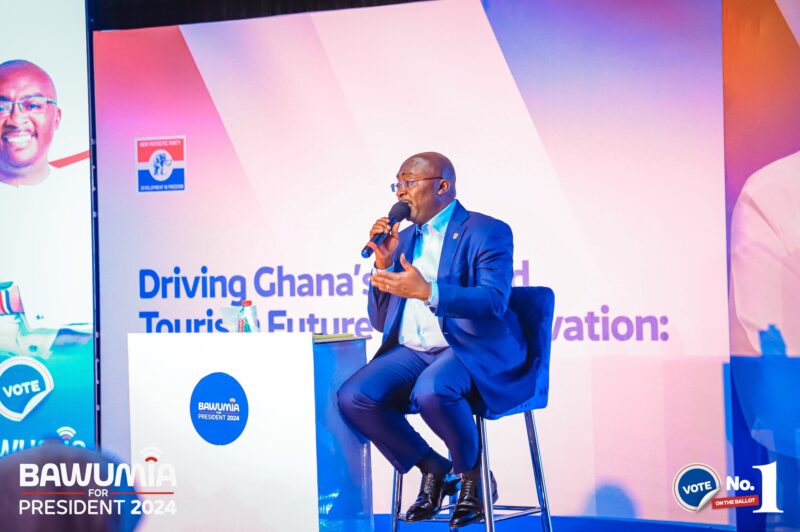"Is it my fault?" was her response while she looked over my shoulder for the waiter who never came to take our order.
She had run out of ways to explain her way out of the perception that the streaming platform she works for seems to unfairly spotlight other host countries over Ghana.
Let's call her Adwoa, she is a top executive with arguably the biggest global streaming giant, and an acquaintance who I had met for breakfast a week ago.
For Adwoa, the data backed the decisions made by her company as South Africa had the existing cultural framework while Nigeria had the population to push things through commercially.
All of these point to one undeniable fact: Ghana's best bet to seeing digital content creation success can only start from developing a well-structured framework.
This is why it felt somewhat out of touch when Vice President Mahamudu Bawumia confidently announced the launch of a local streaming platform in November.

The Vice President and NPP flagbearer’s declaration was clear: the platform would be the country’s first local music and movie streaming service, designed to offer better financial rewards to Ghanaian creatives.
While the announcement is exciting, it raises several questions about its feasibility, potential challenges, and whether it will deliver on its promise or become another unfulfilled government venture.
Don’t get me wrong. The idea is laudable and very feasible, especially given the frustrations Ghanaian artists have faced with earning income from existing household names.
Ideally, a local streaming platform may allow artists to better control their revenue, but its success depends heavily on the platform’s ability to attract users.
There are reasons why local startups who have attempted this feat have yet to find any form of commercial success, which raises eyebrows at this upcoming one's description as the first of its kind, but I digress.
Consumers in Ghana are already used to big platforms like Netflix, so it will require a great user experience, competitive pricing, and solid content to entice them to switch.
So, while feasible, it’s not without its challenges.
One of the biggest bottlenecks is the lack of proper frameworks within which the digital mechanisms surrounding revenue collection can be applied.
This was Adwoa's concern. She constantly compared how easy it was to have access to data in the South African market and how beneficial it was to curate genre-specific activations to fit campaigns.
Another issue is internet accessibility and data costs. Streaming services require a lot of bandwidth, and with data costs in Ghana still relatively high, many potential users could be priced out of the market.

Additionally, the platform will face stiff competition from well-established international platforms.
Netflix invested $175 million in South Africa, Nigeria, and Kenya between 2016 and 2022, according to the company's impact report released in April 2022.
Is the government willing to reach that deep into its pocket to tie all the knots regarding its project?
It is important to note that the two key sources of revenue for these platforms are ads and subscriptions.
Do not forget that, to make this platform appealing, they’ll need exclusive content, affordable data partnerships, and aggressive marketing. Also, the complexity of royalty management can’t be underestimated. Ensuring transparency and timely payment to artists will be critical.
The local creative industry has a significant issue regarding royalties and other non-traditional payment channels. I would have preferred that priority be given to addressing these challenges and helping musicians and filmmakers earn a decent living from their work.
The sophistication of publishing modalities is a hill on its own that requires tons of considerations to master on one platform.
Effective royalty management is a core component of the platform's value proposition. However, previous attempts by organizations like GHAMRO to track and distribute royalties have faced difficulties due to outdated systems and lack of transparency.
To avoid replicating these problems, the platform will need to ensure it has robust mechanisms to accurately track streams and fairly distribute royalties to artists.
If indeed the government is to pursue this agenda, I have a few suggestions… even though I think the Presidential candidate is putting the cart before the horse in this instance.
To avoid becoming a white elephant, this platform needs a solid sustainability plan. Public-private partnerships should be emphasized to ensure professional management.
Collaborating with telecom companies to offer affordable streaming bundles could help lower data costs for users.
Most importantly, the platform must be adaptable and continuously improved—adding new features, updating its content library, meeting copyright demands, and ensuring that the artists see real benefits in terms of royalties and exposure.
Without consistent updates and investment, it could fade out like many government-backed projects before it.
Hopefully, the sweet talk that was delivered at Dr Bawumia's stakeholder engagement does not take after the attitude of our waiter during this breakfast with Adwoa, he never came until my time was up... and I'm still mad about it... lol.
The author, Kenneth Awotwe Darko is a culture journalist, a Professional Member of The Recording Academy - GRAMMYs, and a Forbes BLK Inductee.
Follow him on Twitter via @TheKennethDarko and on Facebook, Kenneth Awotwe Darko.
Latest Stories
-
It’ won’t be business as usual, remain humble – Fifi Kwetey to party members
3 minutes -
Ebenezer Ahumah Djietror appointed as new Clerk to Parliament
43 minutes -
Actress Benyiwaa of ‘Efiewura’ TV series dead
1 hour -
Ashanti Regional Chief Imam dies at age 74
2 hours -
Africa Arts Network calls for tax reform to save Ghana’s theatre industry
2 hours -
SSTN Ghana Chapter reaffirms commitment to economic growth under new leadership
2 hours -
Inlaks strengthens leadership team with key appointments to drive growth across sub-Saharan Africa
3 hours -
Green Financing: What Ghana’s Eco-startups need to know
3 hours -
CHAN Qualifiers: Amoah confident of beating Nigeria
3 hours -
Governments deprioritising health spending – WHO
3 hours -
Lordina Foundation brings Christmas joy to orphans
3 hours -
Yvonne Chaka Chaka to headline ‘The African Festival’ this December
3 hours -
Nigerian man promised pardon after 10 years on death row for stealing hens
3 hours -
Patrick Atangana Fouda: A Hero in the fight against HIV passes away
4 hours -
MGA Foundation deepens support for Potter’s Village
4 hours

